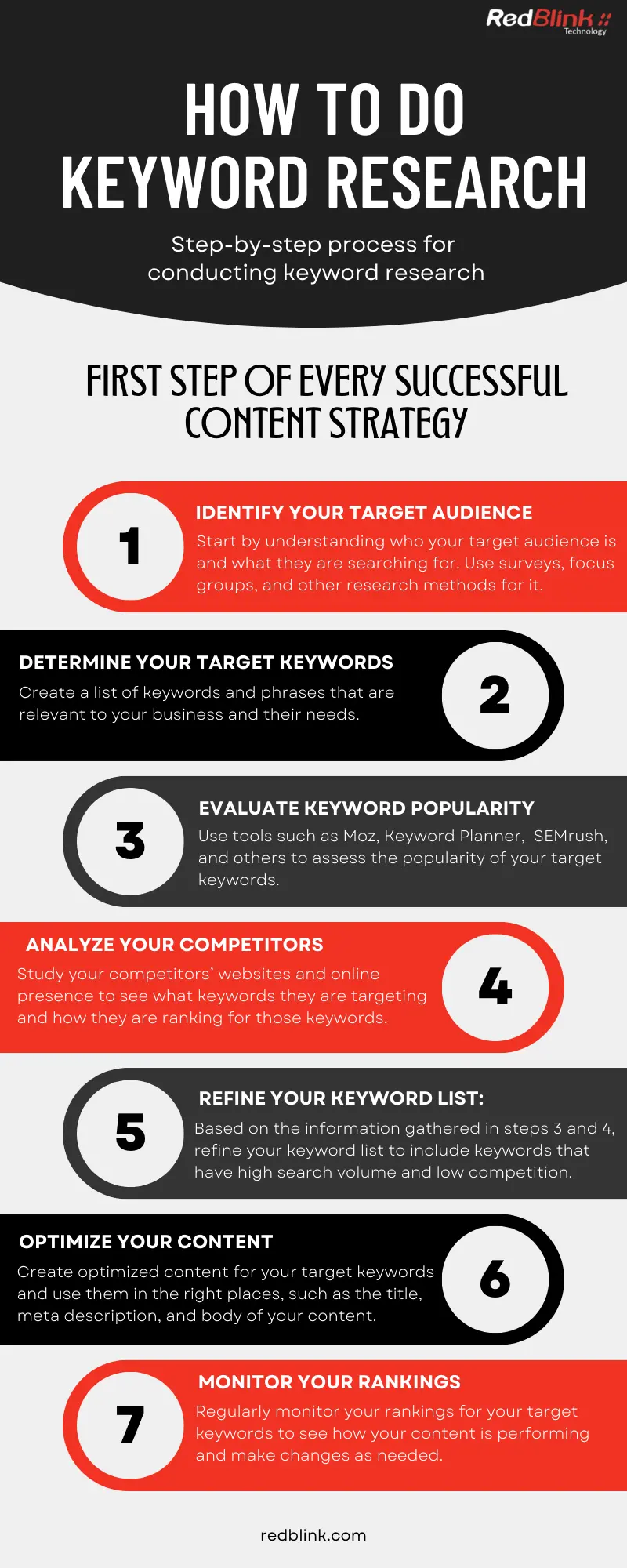Importance of Keyword Research in Content Strategy
“The best way to predict the future of your business is to create it.” – Peter Drucker (father of modern management).
In the same way, keyword research helps the professionals to predict the search terms that your users might be typing in search engines.
By conducting keyword research, you can understand your target audience and you get a clear direction for creating your content. It involves discovering and analyzing the words and phrases that users enter into search engines concerning your business, product, or service. This research provides valuable insight into how users think about and discusses your product, as well as their needs and questions.
The results of keyword research play a crucial role in building a successful content strategy. This information can be used to develop websites that not only follow best UX practices but also align with your target audience’s needs, ensuring optimal website optimization for search engines.

Keyword research has a vital role in developing optimized content useful for search engine optimization (SEO) with higher search results. Let’s see how it works!
Contents
- Importance of Keyword Research in Content Strategy
- What is Keyword Research ?
- Importance of Keyword Research in Content Strategy
- Basics of Keyword Research
- Unfolding Secrets to a Successful Keyword Research Strategy
- Keyword Research Process for a Successful SEO strategy
- Tools to optimize Keyword Research
- Don’t Miss Out: Essential Takeaways and Suggestions for developing a Content Strategy
What is Keyword Research ?
Keyword research is the process of identifying words, phrases, and queries to rank your website on search engine rankings. The aim is to effectively use keywords on the website pages.
The purpose is to find keywords with high search volume and low competition that could be used in heading tags, meta tags, anchor tags and other important positions of the website content. A detailed keyword research not only helps in understanding user search intent queries but also helps in achieving search engine goals for your business.
Importance of Keyword Research in Content Strategy
Good keyword research allows website owners and marketing experts to find what users could be searching while looking to buy your products and services. Search engines use a sophisticated algorithm to provide the user with the best answer from a high authority website related to their search query.
According to a study by Hubspot, “69% of marketers say increasing organic visibility is their top inbound marketing priority”. This highlights the importance of keyword research as it plays a crucial role in increasing a website’s organic visibility by helping to optimize the content for search engines.
A digital marketing expert starts an SEO campaign based on keyword research. To better understand SEO strategy, you need to value keyword research..
A business strategy wraps around the needs of end users. The marketing strategy answers the following user queries:
- What is the top query of a user?
- What is the expectation of users from your brand?
- What will keep them coming back to your website?
- How can you deliver the best service to your marketplace?
When you start thinking with the user’s mind and focus on user engagement, the website content is likely going to meet the requirement. To start with, you can start using SEO tools such as Moz, SEMrush keyword magic tool, and Ahrefs Keyword Explorer. The tools will help you prepare a list of associated search terms, along with traffic statistics showing how often they are used.
Broadly, Keyword research is an extension of catering to the needs of your audience. When you do so, the SERP results are likely to go to the top.
Basics of Keyword Research
The right keyword research will allow the creation of a successful online presence. A strong research strategy is like a crystal ball into the minds of your audience, allowing you to create resonating content. So, let’s get familiar with the basics of starting research on keywords:
-
Monthly Search Volume (MSV)
Monthly Search Volume (MSV) is a starting point for identifying target keywords, but it doesn’t guarantee success. High MSV keywords may drive traffic but not necessarily convert to sales.
On the other hand, low-volume keywords can be more valuable as they reach a more focused audience who are likely to convert. Thus, MSV should be considered alongside other factors when choosing keywords to rank for.
-
User Intent
User intent refers to the objective behind a user’s search query. Understanding user intent is vital for creating content that attracts visitors and drives engagement.
In fact, according to a recent study, 70-75% of search engine users are specifically looking for information and not just browsing aimlessly, highlighting the importance of tailoring content to meet their intent.
If you create content that matches the user’s intention, you will not only attract more visitors. On the other hand, you’ll also increase the likelihood that they’ll take a desired action, such as “a purchase”.
-
Keyword Relevancy
Keyword relevancy refers to the relationship between the keywords used in a piece of content and the topic of that content.
An example of keyword relevancy would be a blog post on “best vegan restaurants in Los Angeles” using relevant keywords such as “vegan,” “restaurants,” “Los Angeles,” and “vegetarian” in the content, title, and meta description.
This helps search engines understand the topic of the content and increases the chances of the post ranking well for those keywords, making it easier for users searching for information on vegan restaurants in Los Angeles to find the post.
-
Long-Tail keywords
Long-tail keywords are specific, longer phrases that are more targeted and less competitive than short, generic keywords. They typically have lower search volume but a higher likelihood of converting into sales or leads.
For example:
- “best women’s running shoes for overpronation”
- “organic dog food for sensitive stomachs”
- “affordable luxury hotels in Paris”
- “best vegan restaurants in Los Angeles”
- “professional portrait photography services in Miami”
These long-tail keywords are much more targeted and relevant than generic keywords like “running shoes,” “dog food,” “hotels,” “restaurants,” or “photography services.” They can help a website or online business rank higher in search engine results pages (SERP) and attract more qualified, motivated visitors.
-
Understanding User Queries
Understand the four types of keywords that categorize different user intentions, essential for crafting a winning keyword strategy:
-
- Informative: These keywords show the user is searching for information or answers to questions (early stage of the buying process).
- Navigational: These keywords reveal the user’s desire to find a specific brand, site, or page (brand-focused searches).
- Commercial: These keywords reflect the user’s research into brands, products, or services (mid-stage of the buying process).
- Transactional: These keywords indicate the user is ready to make a purchase or take action (late stage of the buying process).
Marketers can target users at the right stage of their journey by knowing these keyword types.
-
Local Keyword Research
Local keyword research is a crucial component of local SEO for small businesses. It helps to target a specific geographic location, which is beneficial for establishing a small business or a business with a specific geographic focus.
By using local keywords, businesses can attract more relevant traffic to their websites, thereby increasing the chances of conversions and sales. By identifying opportunities to rank for relevant local keywords, small businesses can stay ahead of their competition and gain a competitive advantage.
A local SEO company‘s strategy that leverages local keyword research has been proven to drive results and is essential for the success of small businesses looking to boost their online presence in a specific geographic area. Utilizing local keyword research and implementing local SEO tactics can help small businesses reach their target audience and achieve their goals.
According to a study by BrightLocal, 76% of consumers who conducted a local search visited a store within 5 miles, and 28% of those searches resulted in a purchase. This highlights the importance of optimizing for local search and the impact it can have on the online presence of the business.
Unfolding Secrets to a Successful Keyword Research Strategy
To conduct effective keyword research:
- Utilize keyword research tools to understand your audience’s search queries.
- Analyze your competitors’ keywords to gain insights into the competitive landscape and content ideas.
- Focus on seasonal and regional trends to identify long-tail keywords.
- Observe organic search results to discover new competitors or target keywords.
For a successful SEO campaign, choose keywords that align with your audience’s intent and drive traffic to the website. This way , you can avoid high bounce rates by avoiding generic terms in favor of long-tail keywords..
Optimizing website content for search engines
Alright, you have an idea of how much traffic your proposed content could get. Now it’s time to do some add on!
Here’s a quick recap:
- Use a tool to find new keywords
- Group similar keywords into content
- Determine the total search volume and potential traffic for each content cluster
- Layer in business statistics to determine the ROI on each page
Keyword Research Process for a Successful SEO strategy
Here is a step-by-step process for conducting keyword research as part of a successful SEO strategy:

By following this process, you can conduct effective keyword research and optimize your content for search engines, ultimately improving your visibility and driving more traffic to your website.
Tools to optimize Keyword Research
To improve search engine results, you can use several paid and free tools To start with, check out these top free- tools:
A free tool that helps you analyze seasonality and regional trends for your keywords. Also, uncover related topics and sub-regions for more focused results.
This tool provides you with insight into how users are searching for your keywords by identifying related questions, phrases, and comparisons. Upgrade to the pro version for added features like time and location filters.
Use this tool, designed for Google’s advertising platform, to gain insight into search queries and competition for your keywords, including average monthly searches and volume trends.
Analyze your website’s current content and discover which search queries are driving traffic to your site with this tool. Also, find information on your site’s search engine ranking positions.
Utilize this feature to see what Google suggests as you type in your keywords and identify new ideas for optimization.
Don’t Miss Out: Essential Takeaways and Suggestions for developing a Content Strategy
In conclusion, keyword research is the backbone of a winning content strategy. By understanding what your target audience is searching for, you can create content that is relevant, useful, and optimized for search engines. With the right tools and approach, keyword research can help you achieve higher rankings, drive more traffic to your site, and increase your online visibility.
If you’re looking to improve your content marketing and SEO efforts, don’t hesitate to reach out to an experienced SEO agency. With their expertise and resources, they can help you create a content strategy that is based on solid keyword research and optimized for success.
So, take action today and invest in the foundation of a winning content strategy – keyword research.

Director of Digital Marketing | NLP Entity SEO Specialist | Data Scientist | Growth Ninja
With more than 15 years of experience, Loveneet Singh is a seasoned digital marketing director, NLP entity SEO specialist, and data scientist. With a passion for all things Google, WordPress, SEO services, web development, and digital marketing, he brings a wealth of knowledge and expertise to every project. Loveneet’s commitment to creating people-first content that aligns with Google’s guidelines ensures that his articles provide a satisfying experience for readers. Stay updated with his insights and strategies to boost your online presence.
